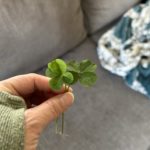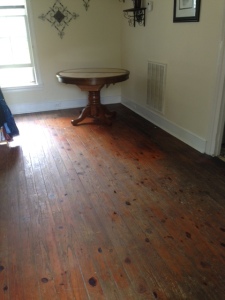academics
now browsing by tag
Staying and Going
My friend Casie posted this today.
I have a couple of responses to this piece, but the primary one is … yes! Just, yes! That I agree with Casie really isn’t a surprising thing.
We first met at her job talk when I walked up to tell her how much I enjoyed her presentation, and before I could get two words out found myself in tears. True story. Honest-to-God tears, accompanied by those “I’m trying not to cry, but it only makes it worse sobs.” She was gracious enough to give me a hug and let me stumble through my little speech. It was my first year on the job and to describe myself as mortified would be a little bit of an understatement. Still, there were few happier moments in that first year then when I heard she had accepted the position.
What could make someone cry at a job talk?
Valid question.
Some of it was probably the stress of my first year. Few periods in my life have been as lonely and as exhausting. The commute, adapting to a completely new work schedule & environment, being the primary source of income for my family, and on top of it all still being a graduate student — I’ve talked before about how all those things add up, and how for me when the stress adds up it usually results in tears. I’m an equal opportunity crier – if I’m sad, I cry; if I’m angry, I cry; if I’m frustrated, I cry; if I’m happy (you guessed it), I cry. In this case it was recognition.
These days it seems like everyone and their second cousin is talking about what it means to be a working class academic, and about the working conditions for graduate students and non-tenure-track faculty. Three years ago, however, it wasn’t exactly the same. Three years ago being a working class academic was just something Ouiser and I talked about sitting on the garage couch when we were in our cups. Ouiser was the first person I knew to start talking about alt-ac careers and the irresponsible mentoring of graduate students. Consequently, when I sat listening to Casie’s job talk about her research with working class academics, it touched something in me. What I meant to say, and what I hope came out between my tears, was that hearing about Casie’s research was like finally being seen. It was the first time I’d heard an academic describe graduate students who could have been me. It was a naming and a calling into being.
So, I guess you can imagine why three years later I find nothing out of the ordinary about once again seeing Casie give voice to thoughts that have been floating around my head. The only thing different is, perhaps, the context. In her post Casie outlines this great list of questions for graduates to consider as they ponder pursuing a PhD and the academic life.
What is it you like about academia? Specifically, what practices make you happy?
What parts of academia stress you out or make you upset?
Is it important that you live in a specific city, state, or region?
What kind of financial compensation do you need to be happy?
What sort of daily or weekly schedule do you envision as your ideal?
Is teaching/research/administration a practice that you could envision yourself engaging with over time?
What feelings do you experience when you think about not working in academia?
What kind of job could you imagine yourself doing and being happy?
Do you like to research and write?
How do you deal with timelines and independent goal setting?
If you had to describe your ideal day at work—from waking up to going to bed—what would that day look like? What challenges might you encounter? What high points might you experience?
What identities do you call on when you consider your self-worth? Your values? How do you prioritize these identities?
Having finally finished and received the PhD (which I somehow still think will be rescinded every time I find another mistake in my dissertation), I find myself looking at the academic job market. I’m considering which jobs and which locations would be right for me, without necessarily thinking about whether or not this is really want I want. Yes, at this point it is what I’m trained to do, but does that necessarily mean it is all I can do, or that it is even really what I want to do? Technically, I am already in academia, and I don’t know that I could answer any one of those questions. I think I am at a point, like the MA student, where it is necessary to decide do I stay or do I go?
Challenges
Earlier this weekend Shelley Rodrigo issued a challenge to her graduate students: The 5 Week Regular Writing Challenge. While I am not one of Shelley’s graduate students and have only met her briefly, I have recently fallen off my regular writing wagon. Since I turned the dissertation in to the ETD editor (the first time), scrubbing floors on my hands and knees has been more appealing that sitting down to the computer to write.
Sure, posting here has been on the up-swing, but that is only because I finally broke down and bought a keyboard for my iPad, which makes it easier to write from anywhere. Unfortunately, I think the dissertation turned my computer desk into a site of trauma. Since the house is small enough that rearranging furniture isn’t really an option, I need to find a way to reclaim the space.
Accepting the Regular Writing Challenge is my way of attempting to re-claim the space and find my writing rhythm again. The biggest issue for me right now is not having a clear project to start with, and not really knowing what I want to write next. My current position does not require me to publish regularly, but I need to get something submitted for publication to prepare for the next position. What I hope to accomplish over the course of the challenge is an easy re-entry into academic writing. My plan for accomplishing this goal looks like this:
- Week 1 – any writing counts
- Week 2 – any writing counts + focused goal: Updating application materials
- Week 3 – any writing counts + focused goal: Begin an annotated bib of recent readings
- Week 4 – any writing counts + focused goal: Free write to develop argument form recent readings
- Week 5 – any writing counts + focused goal: Begin first draft of whatever has developed from bib/free writes.
The idea behind the two different types of goals, any writing + focused writing, is that if it turns out to be too soon to think about academic writing, that I can count any writing I do here towards the challenge and still feel some positive momentum.
And of course today counts! 😉
What I learned in the process
Earlier this week the Malarkey Bin tweeted that Ouiser is putting together an annotated bibliography of advice for anyone considering graduate school. Given that Ouiser often articulates my darker feelings of this whole experience, I think this is an amazingly optimistic of her. I think I’ve crossed into a slightly more jaded realm.
Partly, it is just that in the push to get done I pushed down some serious irritation. Partly, it is that over the course of the last three years I’ve talked a couple different student through decisions about graduate school. While I’ve not actively tried to dissuade anyone, I have tried to be as honest as I can about my own experiences – including sharing the things I wish I’d known when I started -, and I don’t think in any case it has made an impact. However, among all the other powerful influences that lead a person to a position where they need to make a choice about graduate school there is a strong dose of of exceptionalism. I can almost guarantee that every person I talked to about graduate school left my office thinking, “yeah, but…” So, I guess my optimism about offering advice to someone thinking about graduate school has taken a hit.
Today, this came in the mail:
And my heart grew a couple sizes, so here are the two things I wish I’d known at the beginning of graduate school.
First, I wish someone had given me Paul Silva’s How to Write A Lot. During the dissertation process I am pretty sure I ready a million “how to write…” books, and really they all say the same things. For whatever reason, however, I find Silva’s book the most approachable. As someone who got through school on last minute writing, it wasn’t until I started the dissertation that I had to learn how to spend time with an idea, and how to do something besides binge write. I think reading this book earlier in my career might have helped me make something more significant out of my seminar papers.
My second piece of advice is perhaps a little more esoteric; get an Audible account. Audiobooks helped me stay sane in this process because I could listen while driving, doing chores, working out, walking the dogs. The only rule I had for my audible account was that nothing I listened to could have anything to do with my school work. Personally, I listened to fluff – the cheesier the better, detective novels, Stephen King, Dean Koontz, young adult novels. Nothing I listened to required serious thought on my part. The importance of all this listening is that it kept me linked to my love of reading without making me feel guilty for not doing my “work.”
These two thing boil down to – Mind your writing process, and stay connected to what you love.
Slow re-entry
After re-posting my Rizzoli & Isles pieces, I’d hoped to jump back into posting. As you can see, however, that jump has taken a little longer than expected.
Perhaps it is the space I’m in. Once again on the threshold – graduating, but not done with formatting for the graduate school – which really makes it feels like stasis. Since the defense people have started referring to me as Dr., but it doesn’t feel like I am there yet since I’m still making corrections.
Well, I guess that leaks what could have been the first major announcement of this re-boot. Yes, I successfully defended my dissertation! No, I have no idea what I will do now.
Here are just a few of the questions to which I have no answers:
- What happens with my job? What about the significant budget cuts the state just announced?
- Do I want to go on the market?
- If I do, what kind of job do I want? Where do I want to be?
- Do I want to stay in Academia?
- What do I want to do with this blog? What do I want to write about? Do I want to continue to write with a pseudonym? Do I want to attach my name to this space?
- What am I going to do with all my “free” time?
The only thing I can tell right now is that I need to keep writing. For at least two weeks now I have barely looked at my computer. Any online presence I’ve had has been through my phone or iPad, and the only writing I’ve done has been at work, for work.
While this abscence has been cathartic in a way, I also think it has led to my ennui in other areas. I haven’t really been crocheting or watching television or walking or anything but playing games on the iPad. None of that is good for me. The other day, while the DH and I waited in the Dr.s office for 2 hours, I said to him I need to do something – take a dance class, try growing vegetables again, anything. What I realize now is that I also need to start writing again. As you can probably tell that means this space will probably be fairly introspective for a while as I try to determine where to go from here, but I will try to keep the navel gazing to a minimum.
To my surprise I have actually found myself returning to academic research. I expected at least a summer long moratorium on reading anything remotely academic. However, this week I have been to the library twice, and this morning started reading again. I started with Walking and Talking Feminist Rhetorics: Landmark Essays and Controversies. I’ll let you know how it goes.









 D5 Creation
D5 Creation